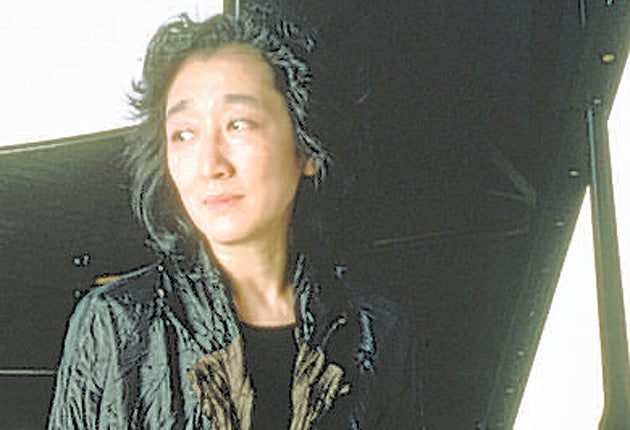Mitsuko Uchida - The reluctant dame and her cup of joy
Mitsuko Uchida doesn't use her title, but the pianist is a stickler for preparation – especially of her tea. Jessica Duchen meets her

Your support helps us to tell the story
From reproductive rights to climate change to Big Tech, The Independent is on the ground when the story is developing. Whether it's investigating the financials of Elon Musk's pro-Trump PAC or producing our latest documentary, 'The A Word', which shines a light on the American women fighting for reproductive rights, we know how important it is to parse out the facts from the messaging.
At such a critical moment in US history, we need reporters on the ground. Your donation allows us to keep sending journalists to speak to both sides of the story.
The Independent is trusted by Americans across the entire political spectrum. And unlike many other quality news outlets, we choose not to lock Americans out of our reporting and analysis with paywalls. We believe quality journalism should be available to everyone, paid for by those who can afford it.
Your support makes all the difference.In a quiet enclave behind Portobello Road, one of the UK's most unusual dames is practising the piano. Mitsuko Uchida was awarded a DBE last year, but she doesn't shout about it. Instead, she reacts with wry humour and warmth when I point out she's the first concert pianist to receive the honour since the much-loved Moura Lympany (who died in 2005).
"It is wonderful to be acknowledged," she remarks. She doesn't use her title publicly, though: "It would look too funny. I played with the Berlin Philharmonic the other day; if the poster had said 'Berlin Philharmonic, conductor Sir Simon Rattle, soloist Dame Mitsuko Uchida', it would have seemed like a sort of English conspiracy! Before, I was quietly doing my job and I will continue to do that. As the conductor Kurt Sanderling, whom I admired greatly, would have said: 'It is my duty to the great masters to do my best.' "
Her "job" involves more than practising and performing: Uchida prepares the music she plays in minute detail, examining the composer's original manuscripts and early editions, considering the implications of every instruction. Similar thoroughness permeates her home life, notably the making of tea. This involves exactly the right measurement of Darjeeling leaves from the first spring picking of a particular field, the brewing perfectly timed, the delectable result sipped from china made in Mozart's day. I'm very scared of dropping anything in Uchida's house. Still, she doesn't take herself too seriously: her ready humour suggests someone content with her choices, artistic, personal or culinary.
She has recently turned her musical microscope upon Schumann in honour of his bicentenary this year; his Davidsbundlertänze features in her upcoming Royal Festival Hall recital as well as on her latest CD.
The trouble with Schumann, she says, is that he kept changing his mind; and so the discrepancies between the autograph manuscript and the early published editions could be either the composer's rethinks, an editor's choices or printing errors.
"You must make your choices," she says. "Which version do you accept as Schumann's heart and soul?" Sometimes a discovery confirms her musical instinct. "One accent in the Davidsbundlertänze I had always felt in the music," she says, "yet never seen printed. In the manuscript, there it was. I always knew that was what he meant."
But there's room for her own personality: "I can't help but be me," she declares. "When you perform, you turn into a bit of an animal, and unless the animal is there, the performance is not interesting. Still, I don't want to play just whatever is 'me'; I want to hear what I found in the music. So when you are performing, at best you are a listener."
Uchida was born in 1948 in Atami, Japan. "At that time in Japan," she says, "I was lucky even to have a piano." When she was 12, her diplomat father was posted to Vienna. It proved an ideal environment for a musical young girl. But while many pianists start out as "prodigies" pushed by ambitious parents, her experience was the opposite.
"My father hoped I'd be good enough to play one recital a year in Tokyo so that he could show up and be proud," she says. "He wanted me to live there and teach kids. I disappointed him." Aged 14, she gave her first recital in Vienna. Concert invitations followed. "My father quietly killed them all. I never knew anything about it."
Instead, she progressed at first through prizes at the prestigious Leeds and Chopin Competitions, then rose steadily to prominence; now, at 61, she is at the top of her game.
Her pianos are her musical partners: she has two Steinways, one made in 1962, the other from the mid 1990s; the former, beautifully mellow, features on her Schumann record, while the other, "big, brilliant and very strong," as she says, accompanies her to London recitals. The pianos live in a studio opposite her house – she has long been a Londoner.
Her human partner, Robert Cooper, director-general for external and politico-military affairs at the EU, lives next door when he's not in Brussels. "This plan suits us," she says. "We both have mighty little time."
Mitsuko Uchida, Royal Festival Hall, London SE1 (0844 875 0073) 5 October. Her Schumann CD is out now on Decca
Join our commenting forum
Join thought-provoking conversations, follow other Independent readers and see their replies
Comments